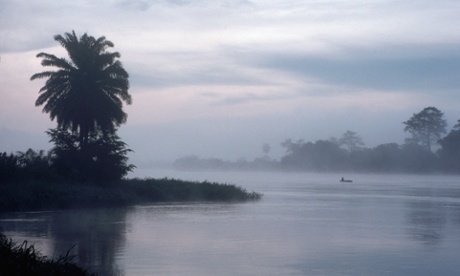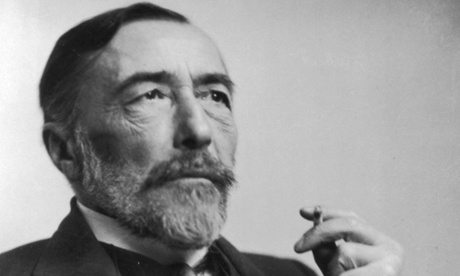Conrad’s famous novella is based on a real journey the author took up the Congo in 1890, during King Leopold II of Belgium’s horrific rule. It is a fantastic, imaginative journey to find a man named Kurtz who has lost his mind in the African jungle. It is a journey into inner space; a metaphorical investigation into the turbid waters of the human soul. It is a political journey into the dark heart of European colonialism. It is a nightmare journey, into horror. It is a journey to nowhere, set on a boat lying motionless and at anchor on the river Thames, which also “has been one of the dark places on the earth”.
There’s no shortage of journeys to talk about in relation to Heart of Darkness – but selfishly, I want to talk about my own. Few things have had such a profound effect on me as my passage towards understanding this book. When I began to realise how many possibilities the book contains, and how beautifully Conrad brings out their meanings, I felt enlightenment. A vague kind of enlightenment, it’s true. One, in fact, described by Conrad himself in a typically glorious – and typically elusive – passage about his narrator Marlow’s storytelling style:
To him the meaning of an episode was not inside like a kernel but outside, enveloping the tale which brought it out only as a glow brings out a haze, in the likeness of one of these misty halos that sometimes are made visible by the spectral illumination of moonshine.
When I first glimpsed that misty halo, I was astonished. It happened a year or so after I initially got hold of the book. That first time, I was about 15 and took Heart of Darkness at face value. I read a densely written, uncomfortable, claustrophobic and strange kind of adventure story. I saw it as a quest gone wrong. Wrong because Kurtz never emerged from the jungle – and wrong because I didn’t quite understand the story or the vague, difficult, ponderously adjectival English.
Quite possibly I’d be thinking about it in the same way now, if it hadn’t become one of my A-level set texts two years later. Thanks to a wonderful teacher, and several rereadings, I came to understand something of those other journeys in the book. I started to see how some writers can say one thing, but mean 15 others. How a well placed image can detonate a thousand bright explosions. Marlow’s boat was steaming into the soul of man – and that was the real heart of darkness. Or at least, it might be. Nothing in the book was definite, and this very uncertainty also overwhelmed me. There were no easy answers.
Now those same 40,000 words meant more than I had previously imagined, I began to feel the intoxication of complication. Not to mention the fascination of the abomination. I learned, in short, a new way to read. I’ve always been grateful. I’ve always adored this book. I have been chasing the same buzz ever since.
Yet part of that journey into understanding was also one into disillusionment and disquiet.
Harold Bloom said that Heart of Darkness has been analysed more than any other work of literature “that is studied in universities and colleges”. I don’t know how he measured it – but I can understand why he might have said it. I can also go some way towards agreeing with his assessment that it is Conrad’s “unique propensity for ambiguity” that makes discussing the book so fascinating. Trying to get hold of the novel’s meaning is like trying to catch smoke with your hands. The very act of describing it makes it harder to grasp – and that makes the challenge all the more enticing.
But there are other reasons ink gets spilled in universities and colleges. When I was reading the book for A-level, that same teacher showed me the 1975 essay in which Chinua Achebe denounced Conrad for denying Africans their humanity, and called the author a “bloody racist”. It was confounding. I could then, and can now, raise a few objections. Marlow’s dehumanisation of Africans is a reflection of the Belgian colonial system he condemns so strongly throughout the book. Marlow specifically says “they were not inhuman” when describing his first sight of people on the Congo and highlights his own problems with empathy. He condemns colonialism. He insists that Europeans are no better, and quite possibly worse, with their hypocritical claim to be “remote from the night of first ages”. The very last line of the book sees the Thames, not the Congo, seeming to lead “into the heart of an immense darkness”. There’s also the important point that Marlow is not Conrad. Plus the fact that it is absurd to insist on modern values in a book written and published in a different age. We can’t ask Horace to share our modern revulsion for slavery.
Ultimately, however, certainty here is as elusive as it is elsewhere in the book. Forty years and forests of paper after Achebe first raised his objections, there remains the fact that the Africans in Heart of Darkness are not portrayed in the same way as the Europeans. It will always be uncomfortable, even though we could argue forever about where the problem lies.
And it’s here that I hit the final realisation on my journey of discovery. Heart of Darkness is so difficult and ambiguous that I’ve realised I will never resolve its challenges – to my own satisfaction or anyone else’s. Nor will anyone else provide definitive answers. You can’t always find conviction. But you can both love a book and find it troubling. The road doesn’t always have an end. The journey continues, even for books that are more than 100 years old.









